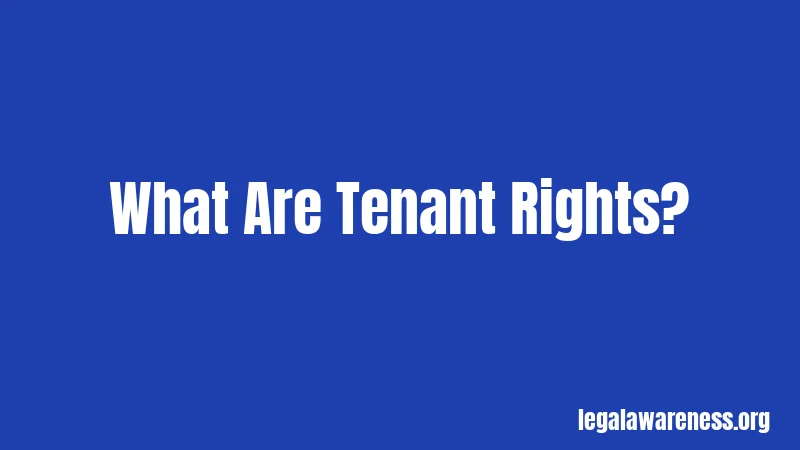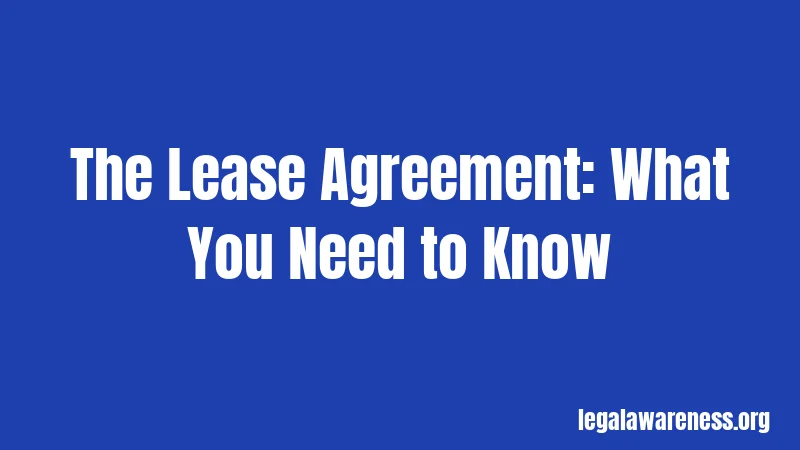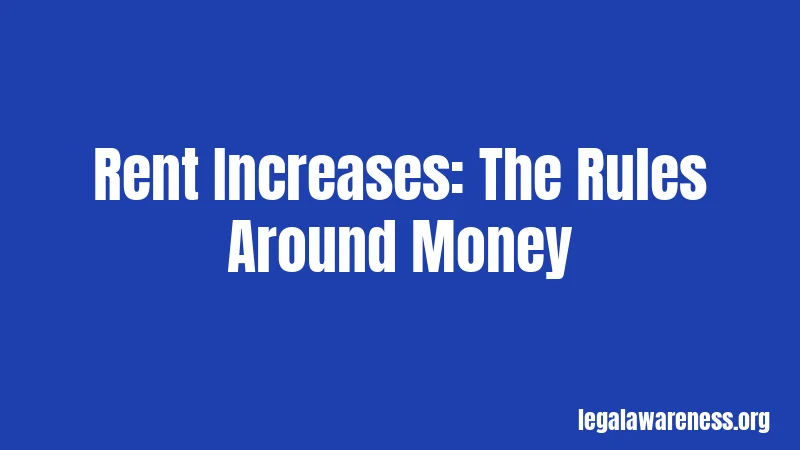New Jersey Tenant Laws (2026): What Every Renter Must Know
Most people don’t realize how protected they actually are as renters in New Jersey. Seriously. This state has some of the strongest tenant protections in the entire country. But here’s the thing: a lot of renters still don’t know their rights. That’s why I wanted to break this down for you in plain English.
Whether you’re signing your first lease or you’ve been renting for years, these laws directly affect you. Let’s talk about what you need to know to stay informed and protect yourself.
What Are Tenant Rights?

Okay, pause. This is important. Tenant rights are basically the legal protections you have as someone who rents a home. In New Jersey, these protections are super strong. Your landlord can’t just do whatever they want. There are rules they have to follow, and breaking them can actually cost them money.
Think of it like this: you have responsibilities as a tenant. But your landlord has responsibilities too. These laws make sure everyone plays fair.
Security Deposits: Let’s Talk Money
Here’s where it gets real. You’re probably gonna pay a security deposit when you sign your lease. New Jersey has very specific rules about what landlords can do with that money.
Your landlord can only charge you up to one and a half months of rent as a security deposit. That’s the legal limit. They can’t ask for more, even if they want to. Pretty straightforward, right?
But wait, there’s more to know. Your landlord has to put that deposit in a special interest-bearing account. They can’t just throw it in their personal bank account. And here’s the important part: they have to give you the account information in writing within 30 days of receiving the deposit.
Wondering what happens when you move out? Your landlord has to return your deposit within 30 days. They can keep money for actual damage or unpaid rent, but they have to show you an itemized list. That means they need to explain exactly what they’re keeping and why. If they’re keeping money, they also have to return it with interest.
Not sure if deductions are fair? Ask your landlord to explain them. If you think they’re wrong, you can take them to court. And honestly, a lot of tenants win these cases.
The Lease Agreement: What You Need to Know

You’re gonna get a lease. It’s basically the contract between you and your landlord. In New Jersey, certain things have to be in that lease.
Your lease must include the names of all tenants and the landlord. It needs the address of the rental property. It also needs the rent amount, when it’s due, and the lease term length. These are the basics.
Here’s what’s super important: the lease must tell you how much the security deposit is. It has to explain the landlord’s responsibility to maintain the property. Your lease should also mention any rules about pets, utilities, and who pays for what.
Stay with me here. Your landlord has to give you a copy of the lease before you sign it. You have the right to read it carefully. Don’t just sign something without understanding what you’re agreeing to. It’s your legal protection.
Maintenance and Repairs: Habitability Matters
This one’s probably the most important rule. Your landlord has to keep the rental property in habitable condition. That means it has to be safe and fit for living in. No exceptions.
What does habitable actually mean? It means the property needs functioning plumbing, heating, electricity, and water. The roof can’t be leaking. The windows need to close properly. The walls can’t have dangerous mold. The doors need locks for security.
If something is broken, you need to report it to your landlord right away. Send it in writing. Email works. Text with a photo works even better. This creates a record. Your landlord then has to fix it within a reasonable time. Most repairs should happen within a few days.
Now here’s where it gets serious. If your landlord doesn’t make repairs, you have options. You can repair it yourself and deduct the cost from rent. You can withhold rent entirely until repairs are made. You can also break the lease without penalty. You could even move out and take the landlord to court for damages.
Honestly, most landlords fix things once you report them. But some don’t. That’s why documenting everything matters so much.
Rent Increases: The Rules Around Money

Your landlord can’t just raise your rent whenever they want. There are specific rules about this in New Jersey.
For rent-controlled properties, your landlord can’t raise rent unless there’s a very specific reason. Different cities have different rules about rent control. Some have it. Some don’t. Check with your city or county to see if your building is rent-controlled.
Even in non-rent-controlled buildings, your landlord can’t raise rent during the lease term. That’s super important. Once you sign a lease, your rent stays the same for the length of that lease. When the lease ends, your landlord can increase the rent for the next lease term.
But wait, there’s more. The increase has to be reasonable. In some areas, rent can’t be raised more than 5% per year. This varies by location. Check your local tenant protections. Some cities have strict limits. Others don’t.
Your landlord also has to give you proper notice. Most require 30 to 60 days notice before a rent increase. Check your lease to see what it says. Either way, get notice in writing. Don’t accept verbal promises about rent.
Eviction: What Actually Constitutes Legal Eviction
Here’s where things get serious. Eviction is not something a landlord can do on a whim. There are specific legal reasons a landlord can evict you.
Your landlord can evict you if you don’t pay rent. They can evict you if you seriously violate the lease terms. They can evict you if you damage the property badly or engage in illegal activity. These are legitimate reasons.
But here’s what’s important: your landlord can’t evict you for reporting code violations. They can’t evict you for joining a tenant organization. They can’t evict you for filing a complaint about living conditions. Those are illegal retaliatory evictions, and New Jersey law protects you.
Not sure if an eviction reason is legal? That’s a good question to ask. If your landlord tries to evict you, you have the right to go to court. A judge will decide if the eviction is legal. You can defend yourself.
The eviction process starts with a formal notice. Your landlord has to give you written notice with a specific amount of time to fix the problem or leave. For non-payment of rent, that’s typically 30 days. For other violations, it depends on the lease.
If you don’t leave or fix the problem, your landlord files in court. You get to present your side to a judge. Many evictions get dismissed because landlords didn’t follow the proper procedure. This is important: you have rights even if you’re behind on rent.
Illegal Eviction: What Your Landlord Cannot Do
Okay, this is critical. Your landlord cannot just change the locks and throw your stuff outside. That’s illegal. It’s called self-help eviction, and it’s a serious violation.
Your landlord cannot shut off your utilities to force you out. They cannot remove your possessions. They cannot remove the front door or windows. These are all illegal, and they can actually sue you for doing them.
The only legal way to evict you is through the court system. Period. If your landlord tries anything else, you can take them to court. You could win damages for the illegal eviction.
Privacy and Entry Rights: Your Home Is Your Castle
You have the right to privacy in your rental. Your landlord can’t just come into your apartment whenever they want. There are specific rules about landlord entry.
Your landlord can enter your rental for legitimate reasons. They can enter to make repairs. They can enter to show the unit to potential new tenants. They can enter to conduct inspections. These are allowed.
But here’s the key: your landlord has to give you notice first. In New Jersey, they typically need to give you 24 hours notice. The notice should say when they’re coming and why. It should be in writing.
Your landlord cannot enter early in the morning or late at night. They can’t enter when you’re not home without good reason. They can’t enter just to snoop around. Respecting your privacy is a legal requirement.
If your landlord enters illegally, you can take them to court. You can also break the lease if they repeatedly violate your privacy. Document every illegal entry. Write down the date, time, and what happened.
Lead Paint Disclosure: Older Properties Matter
Hold on, this part is important. If your rental was built before 1978, it probably has lead-based paint. Your landlord has to tell you about it.
By law, your landlord must disclose lead paint hazards before you sign the lease. They have to give you information about lead risks. They have to give you the right to inspect the property for lead.
You also have the right to a 10-day inspection period. During that time, you can hire someone to test for lead. If lead is found, you can ask your landlord to fix it or break the lease.
Lead is serious. It can cause health problems, especially for children. If your landlord doesn’t disclose lead paint, you have legal recourse. You can sue them for damages.
Mold and Environmental Hazards: Safety First
Your landlord has to keep the property free from mold and other environmental hazards. Mold is a health risk, and New Jersey takes it seriously.
If you see mold, report it immediately. Send written notice to your landlord. Include photos if possible. Your landlord has to investigate and fix the problem.
If the mold is serious or widespread, you might have grounds to break the lease. You might also be able to withhold rent until it’s fixed. Don’t wait around with a mold problem. Address it quickly.
Roommate Rights and Additions: Who Can Live Here
You’re probably wondering if you can get a roommate. The answer depends on your lease and local rules.
Check your lease first. Some leases prohibit roommates without landlord permission. If your lease says roommates are okay, or if it requires permission, ask your landlord. Get their approval in writing.
A roommate situation creates complications. Your landlord might have the right to screen new roommates. They might charge additional rent. Make sure everyone agrees to the terms before moving someone in.
Important: your roommate needs to be on the lease too. If they’re not, they could be considered an unauthorized occupant. That gives your landlord grounds to evict everyone.
Tenant Obligations: Your Responsibilities Matter Too
Okay, here’s the other side. Being a tenant comes with responsibilities too. Your landlord isn’t your only concern. You have legal duties as well.
You have to pay rent on time. You need to follow lease terms. You have to keep the unit reasonably clean and undamaged. You can’t disturb other tenants. You can’t engage in illegal activity.
You also have to maintain smoke detectors and carbon monoxide detectors if required. You have to allow landlord entry with proper notice. You have to report maintenance issues promptly.
Pretty much all of these are common sense. But knowing them helps you understand why your landlord might have complaints.
Tenant Organizations and Unions: Know Your Power
You have the right to organize with other tenants. You can join a tenant union. You can file complaints together. Your landlord can’t punish you for these activities.
This one’s important legally. Your landlord cannot retaliate against you for organizing tenants. They cannot evict you for joining a union. They cannot raise your rent as punishment. These are illegal retaliatory actions.
Tenant organizations can be powerful. They can help you negotiate with your landlord. They can provide information about your rights. They can support you if you need legal help.
What to Do If Your Landlord Violates Your Rights
So what happens if your landlord breaks these rules? You have several options. Stay with me here.
First, document everything. Write down what happened. Include dates, times, and details. Take photos or videos if possible. Keep all written communications with your landlord.
Then, communicate with your landlord in writing. Send an email or letter explaining the problem. Ask them to fix it by a specific date. Keep a copy of this communication.
If they don’t respond, you can file a complaint with your local housing authority. You can also contact a tenant rights organization. New Jersey has several nonprofits that help tenants for free or cheap.
You can sue your landlord in small claims court for damages. You can also hire a lawyer to represent you. Many tenant rights lawyers work on contingency. That means you only pay if you win.
Frequently Asked Questions
Can my landlord charge application fees?
Yes, but there are limits. Application fees can’t exceed $25 or 10% of monthly rent, whichever is less. Your landlord has to return your application fee if you’re rejected. This helps keep applications affordable.
What happens if my landlord doesn’t return my security deposit?
You can sue in small claims court. You could win the deposit amount plus damages. If your landlord willfully withheld your deposit, you might win double or triple the amount. Bring documentation and receipts to court.
Can I break my lease if I’m being harassed?
Yes. If your landlord is harassing you or violating your rights repeatedly, you can break the lease without penalty. This is called constructive eviction. Document everything and get legal help before leaving.
How much notice does my landlord need to give before a rent increase?
At least 30 days. Some areas require 60 days. Check your lease and local laws. Your landlord must give written notice. Don’t accept verbal promises about rent increases.
Can my landlord enter my apartment without permission?
Only with proper notice and legitimate reason. They need 24 hours notice. They can’t enter just to check on things. Your privacy is protected by law.
Final Thoughts
Now you know the basics of New Jersey tenant law. These protections exist to keep you safe and treat you fairly. Use them.
The biggest thing to remember: get everything in writing. Communicate with your landlord in email or letters, not phone calls. Keep records of everything. Take photos of damage. Document dates and times.
If something feels wrong, it probably is. Don’t be afraid to ask questions or seek help. Tenant rights organizations in your area can give free advice. Lawyers can help too.
Stay informed, stay safe, and know that New Jersey has your back as a renter. When in doubt, look it up or reach out to a lawyer.
References
New Jersey Statutes Annotated – Residential Tenancy Laws https://www.nj.gov/nj/legal/
New Jersey Courts: Self-Help Resources for Tenants and Landlords https://www.nj.courts.gov/
Community Resources for Tenants: NJ PROP (Public Rights Organization for Protections) https://www.njprop.org/
New Jersey Consumer Protection Section https://www.nj.gov/oag/
Lead Paint Disclosure Information https://www.epa.gov/lead/renovate-repair-and-paint-rule-federal-requirements
NJ Tenant Rights Guide – Garden State Tenants Organization https://www.njtenants.org/
HUD Fair Housing Information https://www.hud.gov/fairhousing
